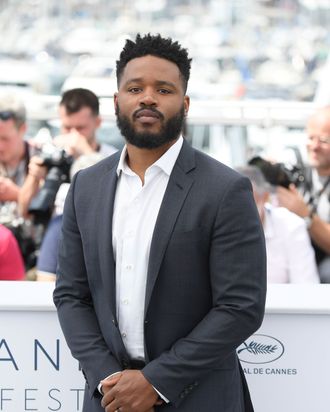
He may have directed a billion-dollar smash in Black Panther, but Ryan Coogler remains humble as can be. Coogler’s talk today at the Cannes Film Festival was one of the hottest tickets on the Croisette, and during the nearly two-hour conversation with Elvis Mitchell, the 31-year-old Coogler came off like someone who hadn’t stopped crossing his fingers. Everyone on the planet has now seen Black Panther at least once, but Coogler still fretted every time the discussion included a spoiler, and when he first started talking about Chadwick Boseman, Coogler sought to clarify that the actor “plays the lead” in Black Panther. We know, Ryan! You made him a megastar!
Coogler’s plainspoken humility was at its most striking whenever the topic of women came up. Mitchell praised Coogler for working with female cinematographers and female editors for all three of his movies, which also include Fruitvale Station and Creed. However, Coogler refused to accept the laurel.
“It’s not something to brag about,” said Coogler. “Honestly, for my first film, I was looking for the best cinematographer I could find. Rachel Morrison was that. She was the best DP we could get at the time, and I thought I was getting somebody amazing, but she turned out to be incredible, just phenomenal in every way, and our dispositions kind of matched each other. We were extremely young, extremely lucky to get her for that project.”
Morrison was the first woman to be nominated for a cinematography Oscar for shooting Dee Rees’s Mudbound, and she and Coogler try to work together whenever possible: In addition to Fruitvale Station, Morrison shot Black Panther and lobbied hard to make Creed even though she was in the final stages of pregnancy. Morrison is “really lovely and sweet but also mad intense and almost militarized when it comes to filmmaking,” said Coogler, who eventually hired Elyse Alberti to shoot Creed. Still, Morrison gave it her best pitch: “She was like, ‘I’ll be off for two days, squeeze the baby out, come back and put the camera back up!’”
Coogler is just as drawn to compelling women in front of the camera, whether it’s the the warrior women of the Dora Milaje in Black Panther, Tessa Thompson’s hearing-impaired musician in Creed, or the characters played by Octavia Spencer and Melonie Diaz in Fruitvale Station. “They’ve very strong women, and I tried to capture that,” said Coogler. “In a macro sense, that’s kind of what the black community is. You find these incredibly strong, layered women [who are] smart, and a lot of times heads of household. That’s the world that I come from [and] the women in my life, the women in my family are amazing and I want to make films that capture that.”
Coogler was particularly thrilled that Black Panther had four incredible parts for Lupita Nyong’o, Danai Gurira, Letitia Wright, and Angela Bassett. “A lot of times, in comic books, it’s a little bit of tokenism: You’ve got one black person, you’ve got one woman that fights,” said Coogler. “I was fired up about that, and I didn’t want to blow the opportunity.”
Mitchell noted that in Black Panther, the women are as important to Wakanda as the men. Coogler thought about it and politely disagreed.
“I think that you could argue that they’re more important in Wakanda,” said Coogler. “There’s a whole section of the film where T’Challa is out of the movie and you’re just following the women, and that’s one of my favorite parts of the movie. I didn’t expect that!”
That section comes after T’Challa is presumed dead and the characters played by Nyong’o, Wright, and Bassett must go off on their own quest to take back the throne. “You feel like you’re watching something fresh and new,” said Coogler. “We have these actresses who could easily carry their own movie, and some of them had before. We had an embarrassment of riches … I would watch a movie with just them.”
“Is that something you would do?” asked Mitchell, sensing a spinoff.
“With those four?” said Coogler. “Oh man, that would be amazing, if the opportunity came up.” Just don’t expect him to take the credit for it.

